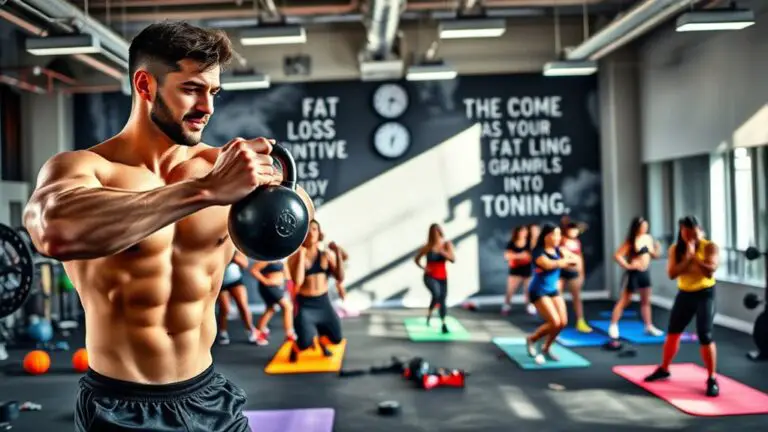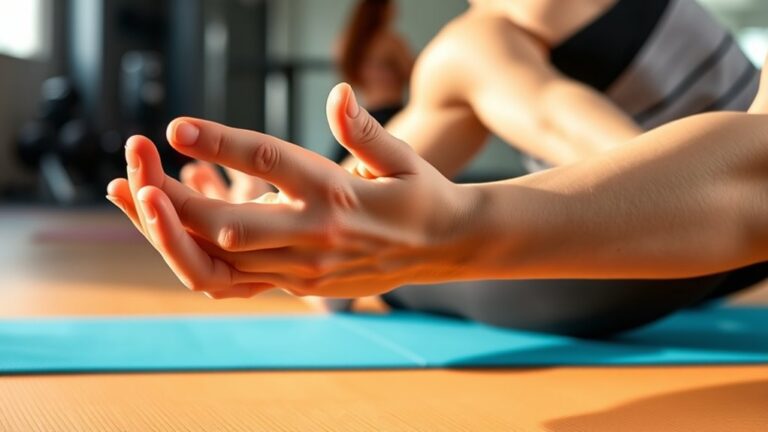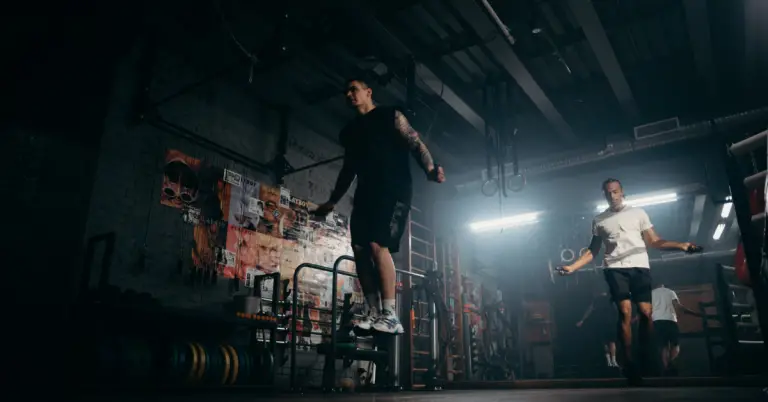30-Day Gym Workout Plan for Beginners
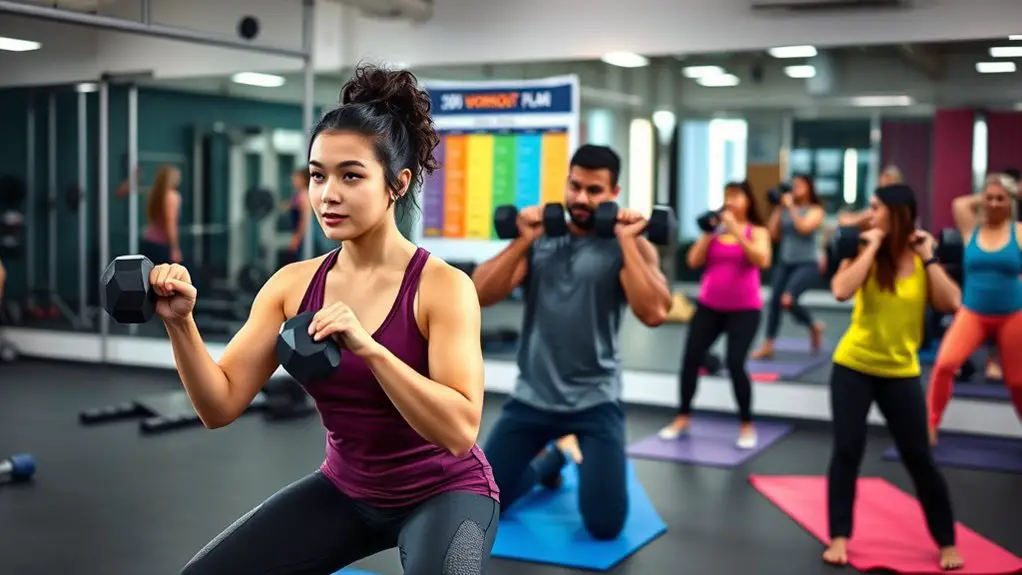
A 30-day gym workout plan for beginners is a great way to build strength and boost endurance. It’ll have you focusing on different muscle groups each week, starting with upper body and moving to lower body, core, and stability. You’ll need some essential equipment like dumbbells, resistance bands, and a yoga mat. Staying motivated is key, so set clear goals and mix up your routine. Keep going, and you’ll discover even more tips to succeed!
Overview of the 30-Day Workout Plan
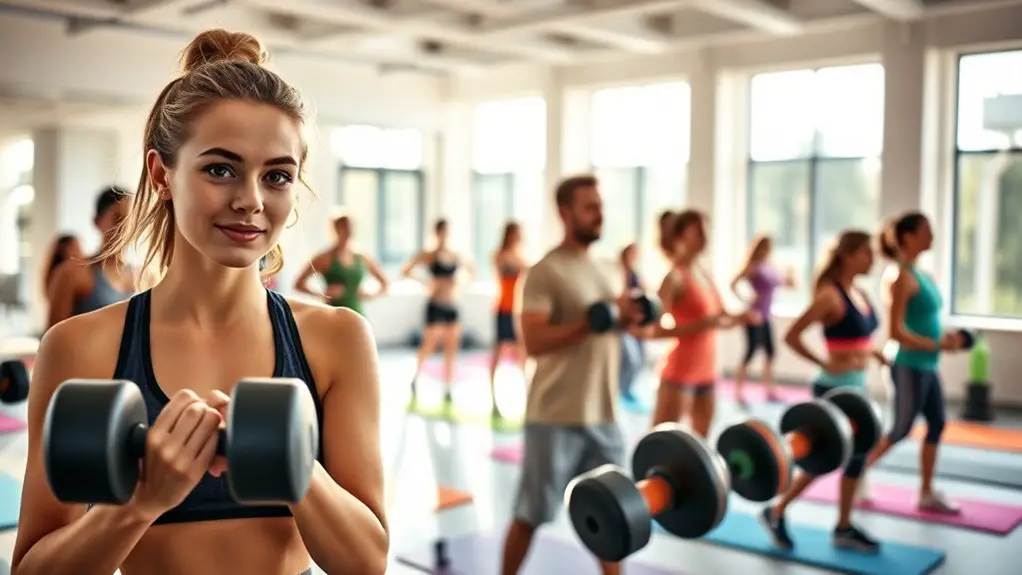
If you’re looking to transform your fitness routine, the 30-Day Gym Workout Plan offers a structured approach to help you achieve your goals. This plan emphasizes the benefits of consistency, making sure you stick to a schedule that gradually builds your strength and endurance. You’ll notice that staying consistent not only fosters progress but also enhances your overall confidence in the gym. Before diving into workouts, it’s essential to understand the importance of warm-ups. Warming up prepares your body for the physical demands ahead, reducing the risk of injury and improving your performance. Each session will start with a warm-up tailored to activate your muscles and increase your heart rate, ensuring you’re ready to tackle the exercises safely. Additionally, consider consulting a personal trainer to gain insights and guidance tailored to your fitness journey.
Weekly Breakdown of Workouts
The 30-Day Gym Workout Plan is broken down into four distinct weeks, each designed to target different muscle groups and build your overall fitness. This breakdown guarantees a balanced workout frequency and introduces exercise variety to keep you engaged.
Here’s a quick overview of what to expect each week:
| Week | Focus Area | Key Exercises |
|---|---|---|
| Week 1 | Upper Body | Push-ups, Rows |
| Week 2 | Lower Body | Squats, Lunges |
| Week 3 | Core and Stability | Planks, Leg Raises |
Incorporating these focused workouts helps you develop strength while minimizing injury risk. Make certain to listen to your body and adjust the intensity as needed. Additionally, consider adding skipping rope to your routine, as it serves as an excellent full-body workout. By following this structured plan, you’ll not only enhance your fitness but also enjoy the journey!
Essential Gym Equipment for Beginners
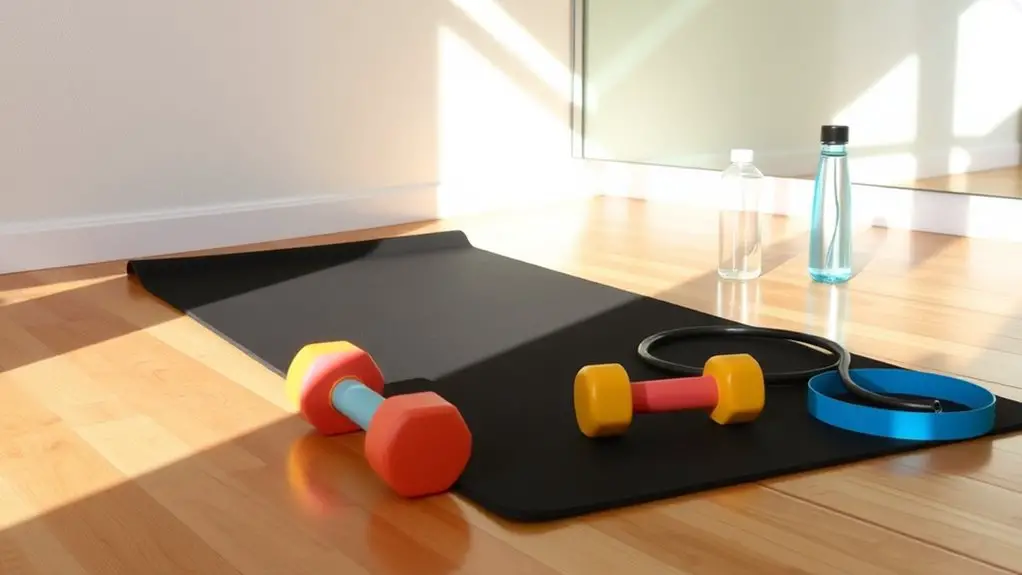
Starting your fitness journey doesn’t have to be overwhelming, especially with just a few essential pieces of gym equipment. As a beginner, you’ll want to focus on basic gym equipment that supports your safety and helps you build confidence.
A good pair of athletic shoes is vital for providing stability and comfort during your workouts. Resistance bands are also great beginner workout essentials, offering versatility while minimizing injury risk as you learn proper form. Dumbbells can help develop strength, but start with lighter weights to guarantee you’re lifting safely.
Consider a yoga mat for floor exercises, providing cushioning and grip. Finally, a stability ball can enhance your core workouts and improve balance. By starting with these basic pieces, you’ll create a solid foundation for your fitness journey, allowing you to progress safely and effectively. Additionally, don’t forget to include a water bottle for hydration to stay refreshed throughout your workouts.
Tips for Staying Motivated
While beginning your fitness journey, staying motivated can be one of the toughest challenges. To keep your spirits high, start with clear goal setting. Break your larger goals into smaller, achievable milestones, which can help you track progress and celebrate successes along the way.
Consider finding workout buddies—having a friend to join you at the gym can make your sessions more enjoyable and hold you accountable. You’re less likely to skip a workout if someone’s counting on you.
Also, mix things up to avoid boredom. Try new exercises or classes to keep your routine fresh. Finally, remember to listen to your body. Safety is key, so don’t push yourself too hard. Celebrate your progress, and stay patient; consistency is essential for long-term success. By applying these tips, you’ll find it easier to stay motivated and committed to your fitness journey. Acknowledge the need for rest days to avoid burnout and keep your workouts enjoyable.
Nutrition Guidelines for Optimal Results

Staying motivated in your fitness journey goes hand in hand with proper nutrition. To see ideal results, focus on meal timing and hydration strategies. Eating balanced meals before and after workouts can greatly impact your performance and recovery. Incorporating exercises like skipping rope can also enhance your overall fitness and support PCOS management.
| Meal Timing | Hydration Strategies |
|---|---|
| Pre-workout: 1-2 hours before | Drink water consistently throughout the day |
| Post-workout: within 30 minutes | Aim for at least 8-10 cups of water daily |
| Snacks: every 3-4 hours | Include electrolytes if exercising intensely |
Incorporating these guidelines helps guarantee you have the energy needed for your workouts and aids in recovery. Prioritize whole foods, lean proteins, and healthy fats to fuel your body effectively. Remember, hydration is just as essential; staying hydrated can improve your performance and overall health. By combining good nutrition with your workout plan, you’ll set yourself up for success.
Tracking Your Progress and Adjustments
To guarantee you’re making the most of your 30-day gym workout plan, tracking your progress is essential. Regularly measuring your progress not only keeps you motivated but also helps you identify areas that need adjustment. Here’s how you can effectively measure your progress and make necessary workout adjustments:
- Keep a workout journal: Note down exercises, weights, and repetitions to see improvements over time.
- Set specific goals: Define achievable milestones, like increasing weights or completing more reps, to guide your training.
- Listen to your body: Pay attention to how you feel during workouts; if you’re consistently fatigued or in pain, it may be time to adjust your routine. Incorporating skipping rope into your routine can further enhance your cardiovascular health and aid in weight loss.
Frequently Asked Questions
How Long Should a Beginner’s Workout Session Last?
As a beginner, your workout duration should generally last between 30 to 60 minutes. This timeframe allows you to focus on form and technique without overexerting yourself. Aim for sessions 3 to 4 times a week to give your body time to recover. Remember, it’s better to start slower and gradually increase intensity than to push too hard and risk injury. Listening to your body is key to a safe and effective fitness journey.
Can I Do This Plan at Home?
You can absolutely do this plan at home! Many theories suggest that effective workouts can occur in any environment, as long as you maintain proper form and safety. For a home workout, consider your equipment options—things like resistance bands, dumbbells, or even bodyweight exercises can be great substitutes. Just be mindful of your space and surroundings to prevent injuries, and remember that consistency is key for achieving your fitness goals!
What Should I Wear to the Gym?
When you’re heading to the gym, choosing the right gym attire is essential. Opt for breathable fabrics like moisture-wicking polyester or cotton blends that keep you cool and dry during your workout. Avoid overly baggy clothes, as they can pose a safety risk. You should also consider supportive footwear to protect your feet. Remember, comfort and functionality are key, so you can focus on your workout without distractions!
Is It Safe to Work Out Every Day?
Imagine your body as a finely-tuned engine; it needs fuel and maintenance to run smoothly. While daily exercise can be invigorating, it’s vital to listen to your body. Just as a car needs rest to avoid burnout, you need rest days to recover and prevent injuries. Striking that balance between activity and recovery guarantees you stay safe and healthy. So, don’t forget to schedule those essential rest days in your routine!
How Can I Prevent Injuries While Exercising?
To prevent injuries while exercising, always start with warm up exercises to prepare your muscles and joints. It’s essential to use proper form during each movement; this minimizes strain and maximizes effectiveness. Listen to your body—if something feels off, stop and assess. Gradually increase intensity and don’t skip rest days, as recovery is just as important. Staying hydrated and wearing appropriate footwear can also help keep you safe during workouts.
